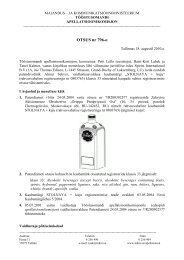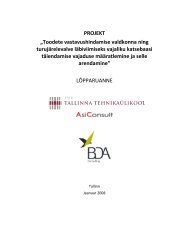Feasibility study for an Estonian Materials Technology Programme
Feasibility study for an Estonian Materials Technology Programme
Feasibility study for an Estonian Materials Technology Programme
You also want an ePaper? Increase the reach of your titles
YUMPU automatically turns print PDFs into web optimized ePapers that Google loves.
84<br />
<strong>Feasibility</strong> <strong>study</strong> <strong>for</strong> <strong>an</strong> Estoni<strong>an</strong> <strong>Materials</strong> <strong>Technology</strong> <strong>Programme</strong><br />
4. Conclusions <strong>an</strong>d recommendations<br />
To succeed: The facilitator has to know the materials technology development field in Estonia, underst<strong>an</strong>d<br />
industry needs <strong>an</strong>d be up-to-date with world-wide developments <strong>an</strong>d trends.<br />
5. <strong>Programme</strong> with strong support actions to prepare <strong>for</strong> future funding “<strong>Materials</strong> R&D to business”<br />
<strong>Programme</strong> has two phases.<br />
First phase lasts 2-3 years where there is a strong emphasis on programme support actions<br />
Facilitation concentrates on<br />
Dissemination of current materials technology research to traditional industry<br />
Enh<strong>an</strong>cement of industry-university cooperation.<br />
Help in applying <strong>for</strong> funding of joint applied research projects (both national <strong>an</strong>d international<br />
funds)<br />
Activation of industry to do R&D<br />
Activating materials technology industry-education projects<br />
In dedicated areas (as chosen in this report), together with industry associations, technology-industry<br />
roadmaps should be done <strong>an</strong>d value-chains could be explored<br />
An import<strong>an</strong>t part of facilitation should focus on international activities<br />
After the first phase there will be a midterm evaluation to assess the continuation of the program.<br />
In the second phase, the programme could include own funding focused on getting materials technology<br />
to business.<br />
However, the distribution of this funding should be made as simple as possible.<br />
For best results, the programme should be started soon after this feasibility <strong>study</strong> has ended.<br />
The key success factor is related to the programme coordinator/facilitator. This person has to<br />
underst<strong>an</strong>d the technology<br />
underst<strong>an</strong>d technology tr<strong>an</strong>sfer<br />
underst<strong>an</strong>d industry needs<br />
Know the situation in Estonia<br />
Be up-to-date with world-wide developments <strong>an</strong>d trends<br />
Work in cooperation with other iniatives (industry associations, clusters, other programs, international<br />
programs etc.)<br />
4.3.3 Key success factors <strong>an</strong>d challenges<br />
Estonia materials technology field needs more concrete collaboration between universities <strong>an</strong>d industries<br />
<strong>an</strong>d this should be facilitated in all possible ways starting from joint education ef<strong>for</strong>ts to joint R&D projects.<br />
The materials technology society of Estonia needs to be brought together.<br />
M<strong>an</strong>y of the professors today will be retire in five years. A challenge is to make sure there knowledge <strong>an</strong>d<br />
skills is passed on to their peers <strong>an</strong>d to comp<strong>an</strong>ies.<br />
It should be understood that comp<strong>an</strong>ies based on materials technology take a long time to develop.<br />
However, they are more likely to build on existing knowledge, industry <strong>an</strong>d build a value-chain around<br />
them.<br />
Facilitation is needed. But the role of the facilitator is very import<strong>an</strong>t. This makes it challenging.<br />
Funding needs to support more applied research <strong>an</strong>d university cooperation. There is a big risk that the<br />
funding schemes will turn out to be too complicated <strong>an</strong>d scattered.<br />
The different programmes in Estonia should not compete against each other. M<strong>an</strong>y players are involved<br />
in several.<br />
The biggest challenge is getting the traditional industry involved. All those we interviewed were interested<br />
but hoped <strong>for</strong> more support <strong>an</strong>d activity from the university side.





